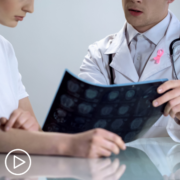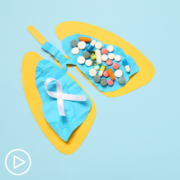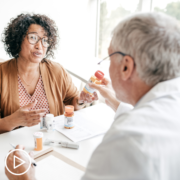What To Do When Newly Diagnosed With Follicular Lymphoma?
What To Do When Newly Diagnosed With Follicular Lymphoma from Patient Empowerment Network on Vimeo.
What should newly diagnosed follicular lymphoma patients take as next steps after diagnosis? Cancer patient Lisa Hatfield and Dr. Matthew Matasar from Memorial Sloan Kettering Cancer Center share advice for patients to be proactive in their care.
See More from START HERE Follicular Lymphoma
Related Resources:

|

|

|
Transcript:
Lisa Hatfield:
When you are first diagnosed with follicular lymphoma, you may not know what to do or what next steps to take. Dr. Matthew Matasar from Memorial Sloan Kettering Center shares what he encourages all his patients to do.
Dr. Matthew Matasar:
Everybody should have access to a second opinion pathology review. This is independent of what the doctors are giving you advice in taking care of the illness, but just making sure that the diagnosis itself is correct. We know that the diagnosis of lymphoma is a tricky one for pathologists, particularly if they’re not pathologists that are seeing lymphoma under the microscope every day of the week. And when you go for a second opinion pathology review by having the slides sent to a major academic center, there’s a possibility that the diagnosis will be changed or revised in a way that’s meaningful meaning that it would lead to different recommendations for how to take care of your illness.
Lisa Hatfield:
As Dr. Matasar says, you can ask your physician or community oncologist to send your diagnosis test results to another institution, particularly one with a lymphoma expert. Let’s listen as Dr. Matasar continues:
Dr. Matthew Matasar:
You’re entitled to a second opinion medical review as well and going to see an expert in lymphoma if your first opinion was with a community oncologist or somebody referred by your primary care doctor who may not have singular expertise in these illnesses, can be helpful.
Lisa Hatfield:
The lymphoma expert that you seek a second opinion from may agree with your local oncologist and suggest collaborating with him/her on your care OR may suggest an alternative such as newer medications your local oncologist may not be up to date on or offer clinical trials. When you have this second opinion consult, be sure to ask questions like “Are there alternatives to the therapy my local doctor or you are suggesting?”, “What is the difference between my options?” and “Are there clinical trials or new drugs that I might be eligible for?” We’ll go back to Dr. Matasar for his last recommendation now:
Dr. Matthew Matasar:
Let your doctors know who you are, how you view things, how you like to receive your healthcare information. Are you a big picture or a detail person, and what are your priorities so that they can best match their recommendations to who you are as an individual, as a person, as a member of a family in the community so that they can give you the most personalized and appropriate recommendations possible.
Lisa Hatfield:
By sharing with your doctor a little bit about you and your personality, you can set yourself up for success to get the best recommendations as possible. We hope these tips help you feel empowered as you begin your follicular lymphoma journey!
Sources:
- https://powerfulpatients.org/2022/10/07/three-key-steps-for-newly-diagnosed-follicular-lymphoma-patients/
- https://powerfulpatients.org/2022/12/05/the-pro-active-follicular-lymphoma-patient-toolkit-resource-guide/









